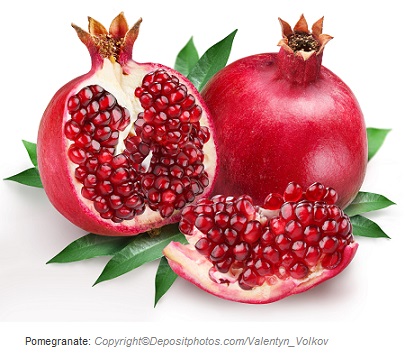Pomegranates vary in size and a medium pomegranate weighs about 280 grams. It is a  fruit with sour to sweet taste, and a medium fruit provides 52 grams of carbohydrates, 11 grams of fiber and 5 grams of protein.
fruit with sour to sweet taste, and a medium fruit provides 52 grams of carbohydrates, 11 grams of fiber and 5 grams of protein.
Average calories: 228 per one medium fruit.
|
Pomegranate: one medium |
|
|
Carbohydrate |
52 |
|
Fiber |
11 |
|
Protein |
5 |
|
Fat |
0 |
|
Calories |
228 |
Vitamins found in higher amounts: vitamins K, C, B9, B1, B5 and B2.
Minerals found in higher amounts: potassium, phosphorus, copper, and magnesium.
Phytonutrients found in higher amounts and their health benefits: pomegranate is famous for being rich in antioxidants. Tannins and flavonoids are the most important phytonutrients in pomegranates.
Tannins include ellagitannins, punicalin, punicalagin, ellagic acid, granatin A, granatin B, and punicafolin, with ellagitannins being the most abundant tannins in pomegranate. Tannins have antioxidant and cancer-preventing properties. Some of them are color-providing pigments.
According to new findings, ellagic acid converts into “Urolithin A” by the bacteria in the gut. Studies have revealed that urolithin A increases life span, helps the body to renew itself, enhances endurance, and prevents from age-related macular degeneration (AMD).
Flavonoids include quercetin, rutin, hesperidin, apigenin, catechin, epicatechin, myricetin, and anthocyanins. They are potent antioxidants with anti-inflammatory, cancer-preventing, color-providing, and tissue-protective properties.
Because of high contents of anti-oxidative phytonutrients, pomegranates are reportedly useful in the following health conditions: high blood pressure, prostate cancer, prostate enlargement, colon cancer, diabetes, heart diseases, allergies, common cold, viral infections, and varicose veins.

